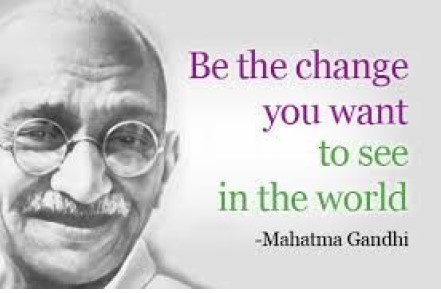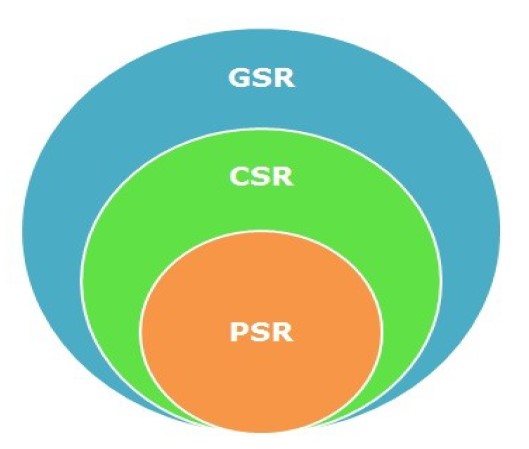Personal Social Responsibility (PSR)
Punit Shukla
PSR is the primary responsibility of every individual toward family, workplace, community, and environment (both ecological and social). Despite lot of positive things being done by individuals to give back to society, even this is not
 enough. This needs to become a social movement to stop further damage to our environment and society.
enough. This needs to become a social movement to stop further damage to our environment and society.
Why PSR? “Be the change you wish to see in the world” Mahatma Gandhi. Historically, it has been Government and more recently corporates along with philanthropists and other like-minded people. However, social responsibility is not only about a series of programs run by the Government for the welfare of the people or corporate or other nongovernmental programs.
Social responsibility is not the vested duty of chosen few, but is and should be the responsibility of every citizen. And this is Personal Social Responsibility (PSR).
Personal Social Responsibility (PSR) aims to positively influence and impact people and environment outside the immediate circle of our social set-up.
Constituents of social responsibility: Social responsibility is an ethical framework which suggests that an entity, be it an organization or individual, has an obligation to act for the benefit of society at large.
Social responsibility has 3 components which ideally should be closely interlinked to maximize the impact.
a. Government Social Responsibility (GSR): The basic duty of a government involves the big social welfare programs through which it creates the best environment for its people.
b. Corporate social responsibility (CSR): is a form of corporate self-regulation integrated into a business model. According to Business Dictionary, CSR is “ A company's sense of responsibility towards the community and environment (both ecological and social) in which it operates.”
c.
 Personal Social Responsibility (PSR) : Accordingly PSR is primary responsibility of every individual towards family, workplace, community, and environment (both ecological and social).
Personal Social Responsibility (PSR) : Accordingly PSR is primary responsibility of every individual towards family, workplace, community, and environment (both ecological and social).
So what is PSR?
• It is the moral responsibility of every citizen to do the right thing.
• It is voluntary and about personal integrity, ethics, commitment and ownership
• It is about give and take and striving towards continuous betterment of society
In these turbulent times, the very fabric of civil society is under threat and is being torn apart. It becomes imperative for every individual to take ownership to do the right thing for the collective good and therefore the need of the hour is PSR.
Each of us have this personal social responsibility, which is equally important to a more familiar term: corporate social responsibility. It is about being a responsible human being in the society where we live and work. It is about learning to return. It is about taking care of what is around us so that the people around us and the planet we live on is left better off when we first started to learn.
Various activities that can be undertaken under PSR .....
· Teaching under-priviledged children
· Tree plantation
· Maintenance of trees planted
· Creating awareness in reducing pollution of rivers during festivities
· Removal of water gargabe from river
· Water conservation at remote villages
Some of the prominent PSR Champions...
Dr Brij Mohan Bharadwaj and Madhuri Bharadwaj - the founders of Apna Ghar Ashram. chain of shelters for the homeless. Apna Ghar has got 21 ashrams across the country that gives shelter to more than 4,000 homeless people.
Sunitha Krishnan : social activist and chief functionary and co-founder of Prajwala, a non-governmental organization that rescues, rehabilitates and reintegrates sex-trafficked victims into society.
Sindhutai Sapkal : affectionately known as the "Mother of Orphans", is an Indian social worker and social activist known particularly for her work in raising orphaned children in India. She was conferred a Doctorate in Literature by the DY Patil Institute of Technology and Research in 2016 and the Nari Shakti Puraskar in 2017.
Navin Gulia : He is a social worker and runs an organization called ‘Apni Duniya Apna Ashiana’ for the welfare of underprivileged children.
Ravi Kalra : Being a non-priest, is perhaps the only person who had cremated more than 4,950 unclaimed and unidentified dead bodies at the electric cremation center. These are the unfortunate dead people brought to the cremation center after the postmortem and police clearance where he offers his helping hand voluntarily to cremate them with prayers so that their souls can rest in peace.
Achyuta Samanta : founder of Kalinga Institute of Industrial Technology; Kalinga Institute of Social Sciences, which provides free accommodation, food, healthcare, and education from class 1 to post-graduation with vocational training
Swami Ramdev : A yoga guru known for his work in ayurveda, business, and agriculture. Ramdev has been holding large yoga camps since 2002.
—00—